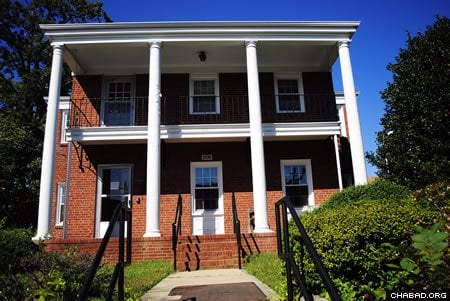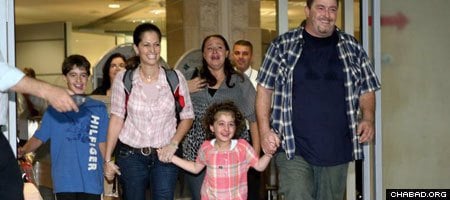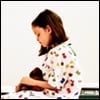Yuval Kadosh was willing to go to the moon to find a bone-marrow transplant for his daughter, Amit. Fortunately, one turned up a little closer to home: across the ocean in Durham, N.C. On three days’ notice, the Kadosh family picked up and made the trek from their home in Israel to Duke University Medical Center in Durham for the procedure that could save 7-year-old Amit’s life.
Enter Rabbi Zalman and Yehudis Bluming. When the couple moved to town in 2002 as co-directors of Chabad-Lubavitch serving Duke University and the University of North Carolina, Chapel Hill, they noticed something crucial was missing from the local scene: a comprehensive support system for Jewish patients and their families.
So they established the Ariella Horenstein Bikur Cholim Society of Duke University Medical Center, a network of volunteers and services aimed at serving Jewish families like Amit’s, far from home and in need of support.
Bikur cholim (visiting the sick) also refers to the practice of assisting and comforting those who are ill, and the Horenstein Bikur Cholim society has many functions. It can assign local volunteers to visit patients, coordinate physical and logistical needs like travel, shopping, child-care and kosher food, and even find appropriate translators for international visitors.
“I found Rabbi Zalman, and I called him. . . and he helped us,” says Kadosh. “It’s unbelievable how it makes you feel, when you’re going to war, and you have [such] big support behind you.”
Duke University Hospital is one of the country’s foremost medical establishments. U.S. News & World Report recently ranked the hospital No. 8 in the country, marking its 23rd consecutive year on its "Best Hospitals" list. Because of its reputation, the center attracts patients from around the country and the world, and for many, the Bikur Cholim Society’s newest service, the Beit Chanoch House of Healing, is perhaps its greatest accomplishment so far.

In November 2011, the House of Healing opened its doors to guests. Replete with several private suites, it is a place where patients and caregivers can stay for up to two weeks at a time, free of cost. Conveniently located directly across the street from Duke University Hospital, the House of Healing is partnered with Duke University Medical Center.
The approximately 3,000-square-foot facility is divided into two apartments—one on the top level and one on the bottom—each with two bedrooms, a cozy living room filled with Jewish books, a television and DVD player, and a kitchenette stocked with all the basics, including bread, eggs, milk, yogurt, fruit and even home-cooked dinners in the freezer, prepared by Yehudis Bluming.
Oryah Vogel of Wilmington, Del., recently stayed at the House of Healing while accompanying her father for his neuroblastomma treatment at Duke University Hospital.
“It was very, very special to have our own house,” says Vogel. “I know for my father the hardest thing is wanting to be in his own environment, and the House of Healing doesn’t have the impersonality of a hotel room,” where they have stayed before during previous treatments. “It’s just very comforting.”
Establishing the House of Healing took some time. Initial meetings between the Blumings and hospital directors at first were unfruitful.
Dr. Ralph Snyderman, former Chancellor Emeritus of Duke University Medical Center, saw merit in their idea and worked on their behalf to help persuade the hospital of the importance of uniquely Jewish accommodations.

“We know that in caring for the patient, we need to think about the entire individual,” said Snyderman. “Often, individuals who are Jewish come to Duke, and their feeling when they come to an institution this big and this complex is often one of anxiety, concern and fear.”
The perseverance paid off. Two-and-a-half years ago, the hospital informed the Blumings of an empty hospital-owned property just across the street from the medical center. Would they want to use it for their facility? Zalman and Yehudis jumped at the opportunity, and renovations began.
Today, the House of Healing is overfilled. Some stay for a night or two, and others for two weeks. If visitors have a special diet, the Blumings will make sure the kitchen is appropriately stocked. No detail is too small, no problem too big.
“We try to be as accommodating as possible. A lot of people come and are completely out of their element and need a lot of help, so we’ll twist ourselves into pretzels to accommodate them,” says Sarah Lipsker, a coordinator for the House of Healing.
Bluming says the facility now plays a critical role for patients and caregivers visiting Duke Medical Center.
“People come here for major, daunting, often harrowing issues,” he says. “It’s important to be a lifeline of hope for them and to be by their side.”







Start a Discussion